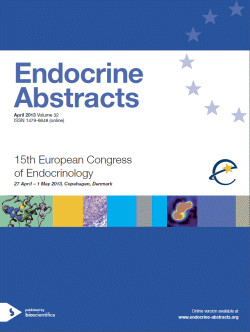Searchable abstracts of presentations at key conferences in endocrinology
Symposia
Energy Status and pituitary function
ea0032s30.1 | Energy Status and pituitary function | ECE2013
Energy status and puberty: novel neuroendocrine regulatory mechanisms
Reproduction is an energy-demanding function. Accordingly, acquisition of reproductive capacity at puberty is metabolically gated, as a means to prevent fertility in conditions of energy insufficiency. In addition, obesity has been shown to impact the timing of puberty and may be among the causes for the earlier trends of pubertal age reported in various countries, especially in girls but probably also in boys. The metabolic control of puberty in such a spectrum of situations,...
ea0032s30.2 | Energy Status and pituitary function | ECE2013
Energy status and glucocorticoid excess
Arvat Emanuela , Karamouzis Ioannis , Berardelli Rita , Picu Andreea , D'Angelo Valentina , Giordano Roberta , Ghigo Ezio
Glucocorticoids (GC) act at different target tissues by binding two different intracellular receptors, the glucocorticoid receptor (GR) and the mineralcorticoid receptor (MR), but the their effects vary considerably between subjects, due to a different sensitivity, which is at least partially, genetically determined. GCs are so named based on their actions on carbohydrate metabolism, namely on insulin-dependent processes. In particular, the effect of GC includes increased hepa...
ea0032s30.3 | Energy Status and pituitary function | ECE2013
Energy status and GH/IGF1 axis
Gahete Manuel , Cordoba-Chacon Jose , Christian Helen , Luque Raul , Kineman Rhonda
GH levels decline with age and weight gain and are enhanced in response to nutrient deprivation. Under these circumstances, GH levels are negatively correlated with IGF1 and insulin levels. Since IGF1 and insulin can directly inhibit GH synthesis and release from primary pituitary cells of different species, it is commonly accepted that changes in circulating IGF1 and insulin serve to directly regulate somatotrope function in response to metabolic extremes. However, teasing ap...




